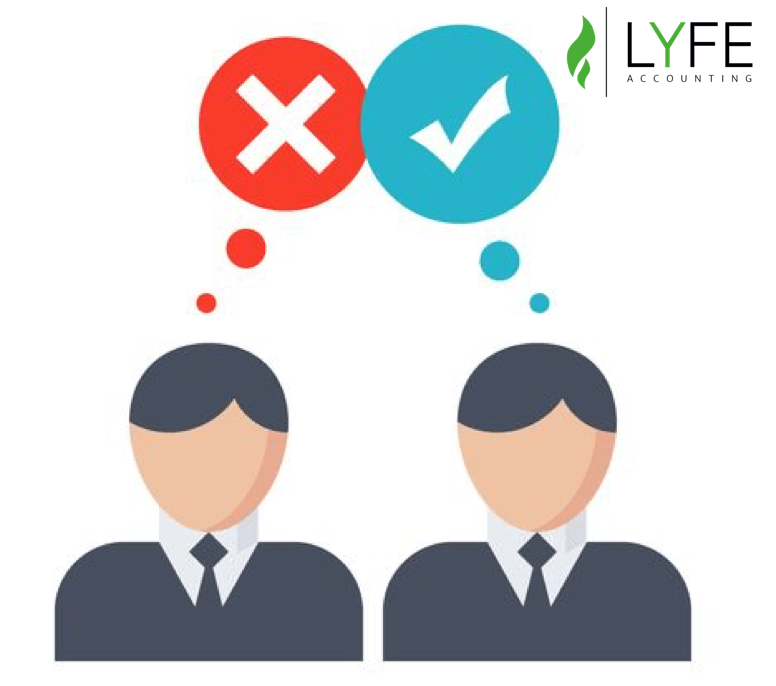What’s the Difference: Accountant vs CPA?
The terms accountant and CPA are not mutually exclusive. Many people believe they are same because they both work with financial data. However, their roles within an organization differ. Their daily duties, the scope of work and how they are viewed by the IRS is what differentiates an accountant vs CPA.
What is an Accountant?

An accountant’s job includes recording business transactions and preparing a company’s financial statements.
A large part of an accountant’s job is bookkeeping in nature. They classify transactions and add them to a company’s records. Once everything is added, they prepare financial statements.
The most common financial statements are the balance sheet, income statement, and cash flow statement. Most business owners don’t necessarily know how to read these statements which is where an accountant comes in.
An accountant knows the ins and outs of financial statements and helps owners and managers decipher them.
Accountants are able to express in plain English the items on a financial statement. With this understanding, owners and managers are able to make better, profitable decisions.
Accountants also perform tax services including tax preparation.
Most people feel anxiety at the thought of doing their own taxes. The reason is clear. No one wants to get in trouble by the IRS. So they trust those duties to an accountant.
Because an accountant usually is responsible for the accounting/bookkeeping piece, tax preparation is a smoother process. An accountant would already have experience and knowledge in a company’s records and filing their taxes would be as simple as placing the numbers on the right line on the tax return.
What is a CPA?
A CPA can do everything an accountant does. In addition to what was mentioned above, a Certified Public Accountant is a financial advisor who has met experience and education requirements. CPAs also pass a rigorous 4 part examination administered by the state. The CPA exam is said to be one of the hardest professional exams, with a pass rate of under 50%.
CPAs also have to maintain their license by completing 40 hours of CPE or Continuing Professional Education. This is to ensure that all CPAs are up to on the latest accounting and tax rules and practices.
Because of their legal designation, CPAs are able to do more than a typical accountant. Only CPAs can render an opinion on an audit of financial statements. Or if you need representation in an IRS tax dispute, only an active CPA (or lawyer) could do that for you.
Accountant vs CPA: The Differences

From a legalistic point of view, Certified Public Accountants and accountants are very different. To a certain extent, anyone could call themselves an accountant. If you manage your own company’s books and finances, you might consider yourself an accountant! Even without any formal accounting education or experience.
On the flip side, not everyone can call themselves a CPA. CPAs are certified individuals in the field of accounting. Their title holds more weight in the business world. When you’re working with a CPA, you know for certain that they went to school and has experience in the accounting field.
Accountant vs CPA: The Similarities
Although CPAs and accountants have their differences, they also have a lot of similarities. They do a lot of the same things on a day to day basis. Some similar tasks include reconciling bank transactions or preparing financial statements.
Even with “CPA only” tasks. An accountant could assist with audits and IRS cases as long as a CPA is supervising.
Which One Do You Need For Your Business?

There’s no doubt that your business needs an accounting professional to help with your finances. The only way to grow your business is by having reliable financial statements at your disposal. And having an accounting professional on your team ensures, not only financial statements but consultation on those financial statements, so you can make better decisions.
But which one does your business need?
It depends.
Some business owners prefer the education and expertise a CPA brings to the table. As stated above, CPAs are more of a financial advisor for your business. Where an accountant might simply prepare your taxes, a CPA would put greater efforts into tax planning.
On the other hand, some business owners could care less about titles and simply want an accountant. This option works too if audits and IRS issues are not apart of your accounting function.
Keep in mind, that some accountants may not have a degree in accounting, therefore, their knowledge may be limited. They might only have working knowledge on the specific companies they have worked for in the past. On the plus side, if you do find a qualified accountant, their hourly rate is usually significantly lower than that of a CPA.
In Summary
All CPAs are accountants but not all accountants are CPAs.
On a high level, the major difference between an accountant and Certified Public Accountant is the certification.
CPAs go to school longer, get qualified working experience, and maintain their license through continuing professional education. They have the proper credentials to render audit opinions. For a number of companies, financial statement audits are legally required (i.e. public companies or nonprofits). CPAs can also represent you against the IRS.
Accountants generally can do the same tasks as CPAs (except audits and IRS representation). Accountants help organize your business finances and prepare financial statements. They may or may not have a degree in accounting but likely has some sort of experience in accounting.
When considering between an accountant and CPA, think about the financial needs of your company. If you want more of a financial consultant, advisor, or even CFO (Chief Financial Officer), a CPA would be a better fit. Or if you want accounting services beyond just bookkeeping, a CPA is who you need.
If not, an accountant can satisfy your business needs just fine. Just make sure you ask about their work, educational credentials and if they have experience in your industry.
Here at LYFE Accounting, we have both qualified CPAs and accountants, in-house that can help serve your company’s financial needs. Contact us today to learn more!

